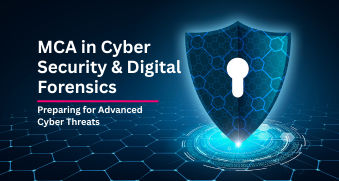MCA in Cybersecurity & Digital Forensics: Preparing for Advanced Cyber Threats
Master in Cybersecurity & Digital Forensics provides students with the technical know-how and training needed to combat these threats effectively.


The digital world advancing at an ever-increasing rate, there has never been a greater need for trained cybersecurity and digital forensics professionals. With threats to computers constantly changing and growing more advanced, companies need individuals who are well-equipped to safeguard their cyber properties and search out possible invasions. Master in Cybersecurity & Digital Forensics provides students with the technical know-how and training needed to combat these threats effectively.
Understanding the Importance of Cybersecurity
Governments and companies all around now give cybersecurity first importance. The fast digitization of services along with the growing connectivity of systems have produced a complex ecosystem ready for cybercrime exploitation. AI-powered cyberattacks are becoming more common in 2025; 60% of IT professionals worldwide find this to be the most alarming danger resulting from AI for the next years. This emphasizes how urgently cybersecurity experts who can keep ahead of these changing cyber threats are needed.
Key Benefits of Pursuing an Masters in Cybersecurity & Digital Forensics
An MCA program specializing in Cybersecurity and Digital Forensics offers numerous advantages:
- Comprehensive skill development in both defensive and investigative aspects of cybersecurity
- Exposure to cutting-edge technologies and methodologies
- Hands-on experience with industry-standard tools and techniques
- Understanding of legal and ethical considerations in cybersecurity
- Preparation for high-demand, well-compensated career opportunities
Core Skills Developed in the Master's in Cybersecurity & Digital Forensics Program
Students in this program gain expertise in:
- Network security and cryptography
- Malware analysis and reverse engineering
- Digital forensics and incident response
- Ethical hacking and penetration testing
- Cloud security and IoT security
- Cybersecurity governance and risk management
These skills are crucial for addressing the complex cybersecurity challenges faced by organizations today.
The Role of Digital Forensics in Investigating Cyber Crimes
- Identifying security breaches promptly
- Collecting and preserving digital evidence
- Determining the identity and motives of attackers
- Improving overall security posture by identifying vulnerabilities
- Ensuring compliance with legal and regulatory requirements
Why an MCA in Cybersecurity & Digital Forensics Opens Doors to Lucrative Careers
- Cybersecurity Analyst
- Digital Forensics Expert
- Penetration Tester
- Security Operations Center (SOC) Analyst
- Malware Analyst
- Security Consultant
Industry Trends Shaping the Future of Cybersecurity & Digital Forensics
- Artificial intelligence and machine learning: It serve both as weapons in the hands of attackers and defensive tools.
- Cloud Security: As more companies transition to the cloud, maintaining security in these environments becomes more critical.
- IoT Security: The explosion of linked devices generates fresh attack routes
- Ransomware Evolution: Attacks using ransomware are become increasingly sophisticated and focused.
- Privacy Rules: Emphasizing worldwide data protection and privacy rules
- Privacy Regulations: Cybersecurity experts who want to keep ahead of risks and properly defend companies must first grasp these patterns.
Cybersecurity & Digital Forensics - Frequently Asked Questions
How do cybersecurity challenges evolve with the rise of cloud computing and remote work?
The shift to cloud computing and remote work has expanded the attack surface for cybercriminals. Organizations must now secure a distributed network of devices and cloud-based services, making traditional perimeter-based security insufficient. This evolution demands new approaches to identity and access management, data encryption, and network security.
How can businesses address common cyber security threats effectively?
Businesses can address common cyber security threats by implementing a multi-layered security approach. This includes:
- Regular security awareness training for employees
- Implementing strong access controls and multi-factor authentication
- Keeping software and systems up-to-date with the latest security patches
- Using advanced threat detection and response tools
- Developing and regularly testing incident response plans
- Ransomware attacks
- Phishing and social engineering
- Supply chain attacks
- Cloud security vulnerabilities
- IoT device security
- Insider threats
- AI-powered cyber-attacks
- AI-enhanced malware and phishing attacks
- Deepfake technology used for social engineering
- Attacks targeting critical infrastructure
- Exploitation of 5G network vulnerabilities
- Quantum computing threats to encryption
- Increased targeting of cloud services and remote work infrastructure
- Advanced technical skills to combat sophisticated threats
- Understanding of emerging technologies and their security implications
- Knowledge of cybersecurity frameworks and best practices
- Ability to conduct thorough digital forensics investigations
- Skills to develop and implement comprehensive security strategies


CATEGORIES
- MBA Program
- Data Science and Analytics
- Cloud Computing
- Data Analytics and Business Intelligence
- AI and Digital Systems
- Cyber Security and Digital Forensics
- Business Analytics & Intelligence
- Banking & Financial Services
- International Business
- Digital Marketing
- Research Paper
- Media & Entertainment
- Media Management
- Journalism and Media Production
- Media & Information Technology
- Visual Communication
- Game Development
- Sound Engineering
- Game Art & Design
- Photography
- Film Making
- Animation & VFX
Are you aspiring to become a proficient Cyber Security and Digital Forensics professional?
Look no further; we are committed to nurturing the potential of young minds. Are you ready to enhance your skills?


